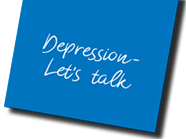Assessing suicidal risk
Depression and suicide are strongly linked, with 10-15% of patients with severe recurring depression eventually dying by suicide. Between 40 and 70% of depressed patients have suicidal thoughts, and more than 90% of people who die by suicide have suffered from a mental disorder, most often depression.
Indicators for acute suicidality include a crisis with psychopathological markers such as pressing suicidal thoughts, hopelessness and helplessness, inadequate feelings of guilt, a strong desire for action or impulsivity, drugs and alcohol abuse and direct and indirect announcements of suicide.
GPs should ask directly whether a patient has suicidal thoughts or plans: there is good evidence that this will not make them more likely to harm themselves, and it may come as a relief to a person in crisis to be able to discuss their concerns openly.
If a patient is experiencing suicidality, involve relatives and specialists and ensure that the person has continuous care. Make sure to link back in with the patient at short intervals.
Suicide risk assessment is crucial in severe cases. It is important that GPs know how to explore suicide risk in patients.



